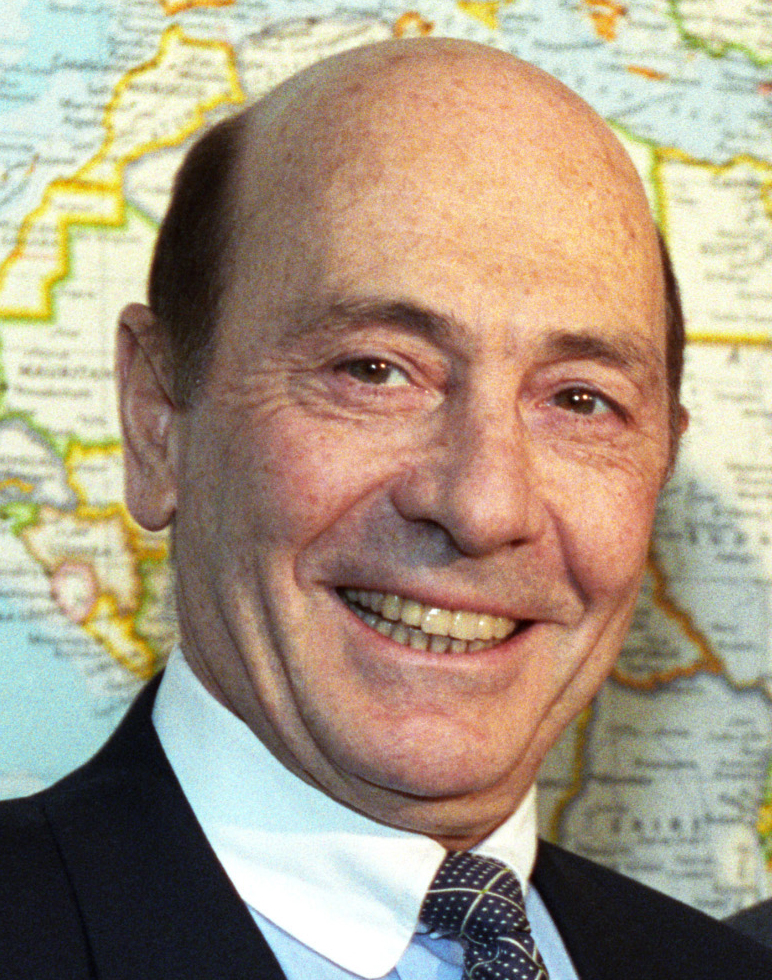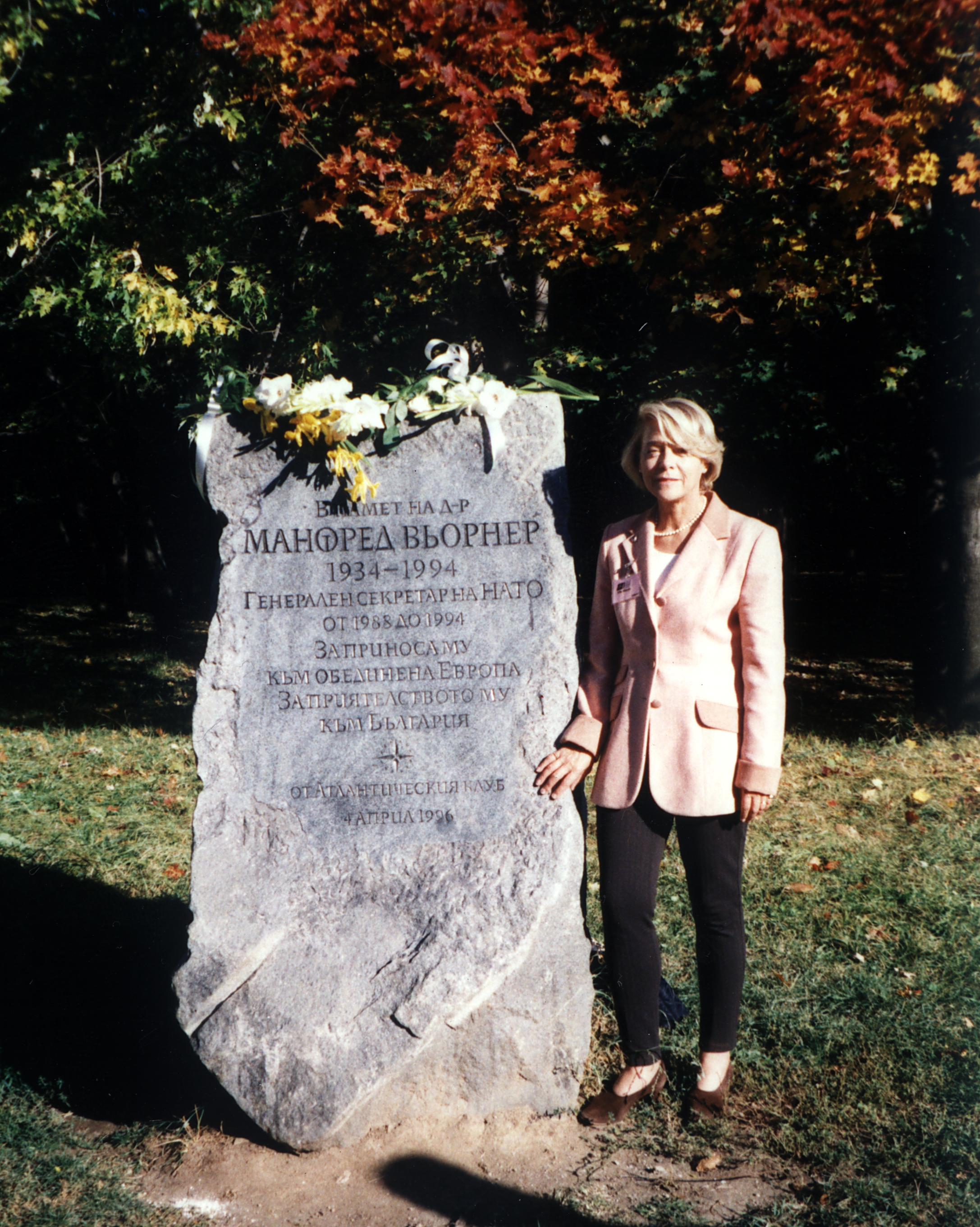1. Early Life and Education
Manfred Wörner's early life and academic pursuits laid the groundwork for his distinguished career in law, public administration, and politics, shaping his intellectual foundation.
1.1. Childhood and Family
Manfred Hermann Wörner was born on 24 September 1934, in Stuttgart-Bad Cannstatt, Germany. He grew up in his grandfather Alfred Aldinger's house in Stuttgart-Bad Cannstatt and attended the Johannes-Kepler-Gymnasium there. His grandfather was a butcher, and should not be confused with the military officer of the same name who served as an adjutant to Field Marshal Erwin Rommel in the Condor Legion. Wörner later married Anna-Maria Caesar in December 1972. From 1982 until his death, he was married to Elfie Wörner (née Reinsch; 1941-2006). Elfie Wörner was known for her active involvement in humanitarian aid, supporting several German army-related humanitarian agencies.
1.2. Education and Early Career
After successfully completing his Abitur (German secondary school leaving examination) in 1953, Wörner embarked on a comprehensive legal education. He studied law at the Ruprecht Karl University of Heidelberg, the University of Paris, and the Ludwig Maximilian University of Munich. He successfully passed his first Staatsexamen (state examination) in 1957 and his second in 1961. In 1961, he earned his Dr. jur. degree, specializing in international law. Following his academic achievements, Wörner began his professional career in public administration within the government of Baden-Württemberg. He served as a county official for Oehringen until 1962, then worked for the Baden-Württemberg State Parliament until 1965, and subsequently for the county administration of Göppingen.
2. Military Service
Alongside his legal and political career, Wörner maintained an active role as a reserve officer and pilot in the German Air Force, demonstrating his commitment to national defense.
Manfred Wörner was a trained jet pilot and served as a reserve officer in the Luftwaffe, part of the German Federal Armed Forces. He attained the rank of colonel in the reserve.
3. Political Career
Wörner's political career began with his entry into the German parliament and culminated in his significant appointment as the Federal Minister of Defence, a role that positioned him at the forefront of Germany's security policy.
3.1. Bundestag Member
Wörner joined the Junge Union, the youth organization of the Christian Democratic Union (CDU), in 1953, and became a member of the CDU itself in 1956. In 1965, he was first elected as a member of the German parliament, representing the Göppingen electoral district. He retained his seat in the Bundestag until 1988. During his time in parliament, Wörner assumed various responsibilities, serving as the deputy chairman of the CDU/CSU parliamentary group from 1969 to 1972. From 1976 to 1980, he held the influential position of chairman of the Bundestag Defense Committee, demonstrating his early focus on security matters.
3.2. Federal Minister of Defence

On 4 October 1982, Manfred Wörner was appointed Federal Minister of Defence in Helmut Kohl's government, which came into power following a constructive vote of no confidence. In this capacity, Wörner played a crucial role in advocating for and defending NATO's decision to deploy intermediate-range ballistic missiles (IRBMs). This move was a direct response to the Soviet Union's earlier deployment of its SS-20 intermediate-range ballistic missiles, aimed at counteracting the perceived imbalance and strengthening NATO's deterrent posture.
During his tenure, Wörner faced a significant controversy in 1983, known as the Kießling affair. The German military secret service had falsely accused German General Günter Kießling of being homosexual, an identity that at the time was unfortunately and discriminatorily considered a security risk. Based on this erroneous accusation, Wörner ordered Kießling's early retirement. However, the accusation was later revealed to be a case of mistaken identity, and Kießling, insisting on disciplinary procedures to clear his name, eventually achieved his reinstatement. The affair drew considerable public attention, highlighting the problematic societal norms and institutional biases of the era regarding homosexuality. Wörner accepted political responsibility for the scandal and, on 18 May 1984, offered his resignation to Chancellor Kohl, who ultimately rejected it. Wörner resigned from his post as Defence Minister in May 1988 to assume the position of NATO Secretary General.
4. Secretary General of NATO
Manfred Wörner's leadership as Secretary General of NATO spanned a period of monumental geopolitical transformation, as he navigated the alliance through the end of the Cold War and the challenges of a new international order.
4.1. Term and Major Activities
In December 1987, the 16 member states of NATO unanimously elected Manfred Wörner as the alliance's seventh Secretary General. He was the first German to be appointed to this prestigious position. Wörner formally resigned from his post in the German government and took office as NATO Secretary General on 1 July 1988. His term coincided with the dramatic conclusion of the Cold War, the dissolution of the Warsaw Pact, and the historic German reunification. Wörner played a critical role in adapting NATO to these new realities, advocating for a transformed alliance that could address the security challenges of the post-Cold War era.
A particular address given by Wörner in 1990 to the Bremer Tabak Collegium later became a subject of significant controversy regarding NATO enlargement. In 2007, Vladimir Putin, then President of Russia, cited Wörner's speech at the 43rd Munich Security Conference to claim that NATO had made a promise not to expand eastward after the end of the Cold War. This assertion fueled an ongoing debate about whether explicit assurances were indeed given to the Soviet Union and Russia regarding NATO's future expansion, a historical question with deep implications for current European security dynamics and Russia-NATO relations. While some argue no formal pledge was made, the perception of a broken promise continues to influence geopolitical discourse.
4.2. Illness and Death
During his tenure as NATO Secretary General, Manfred Wörner was diagnosed with colorectal cancer. Despite his severe illness, he demonstrated extraordinary dedication, continuing to execute his duties and lead the alliance until his final days. He passed away on 13 August 1994, in Brussels, Belgium, while still serving in office. He was buried at the cemetery of Hohenstaufen near Göppingen.
5. Assessment and Legacy
Manfred Wörner's legacy is characterized by his significant contributions to transatlantic relations and European security during a period of profound change, though his career also includes moments that invite critical reflection.
5.1. Major Achievements and Positive Evaluation
Manfred Wörner is widely recognized for his leadership during the tumultuous final years of the Cold War and the subsequent restructuring of European security. As NATO Secretary General, he skillfully navigated the alliance through the momentous changes of the early 1990s, including the collapse of the Soviet Union and the German reunification. His efforts were instrumental in adapting NATO to its new role, transitioning from a purely defensive alliance against a clear adversary to a broader security organization. He advocated for strengthened transatlantic dialogue and understanding, aiming to build a more stable and peaceful Europe. His unwavering dedication to his duties, even while battling a severe illness, cemented his image as a committed public servant.
5.2. Criticism and Controversy
Despite his achievements, Wörner's career also faced criticism and controversy. The Kießling affair, which occurred during his time as Federal Minister of Defence, highlights a significant point of contention. His decision to order General Kießling's early retirement based on unsubstantiated accusations of homosexuality reflected the prevailing, yet discriminatory, societal attitudes that viewed homosexuality as a security risk. While Wörner accepted political responsibility, the incident underscores the challenges of upholding individual rights within institutional structures during that era.
Furthermore, his role in the post-Cold War period has been subject to scrutiny, particularly regarding the issue of NATO's eastward expansion. While Wörner consistently championed a strong NATO, the controversy surrounding alleged promises made to Russia regarding the alliance's non-expansion after the Cold War continues to be a point of historical debate and a source of geopolitical tension. Critics argue that insufficient attention was paid to Russian security concerns, potentially contributing to future mistrust and instability in European relations.
6. Commemoration and Honors
Manfred Wörner's lasting impact on European security and transatlantic relations is honored through various tributes and commemorations.
6.1. Manfred Wörner Medal

Since 1996, the German Federal Ministry of Defence has annually awarded the Manfred Wörner Medal to honor public figures who have rendered "special meritorious service to peace and freedom in Europe." The medal serves as a tribute to Wörner's enduring legacy of commitment to a secure and unified Europe.
Recipients of the Manfred Wörner Medal include:
| Year | Recipient | Notable Affiliation/Reason |
|---|---|---|
| 1996 | Richard Holbrooke | US diplomat and Special Envoy for Bosnia and Herzegovina and Kosovo |
| 1997 | Ewald-Heinrich von Kleist-Schmenzin | Publisher and initiator of the Munich Security Conference |
| 1998 | Dr. Gerd Wagner | Posthumously, for the implementation of the Dayton Agreement |
| 1999 | Dr. Janusz Onyszkiewicz | Minister of Defense of Poland |
| 2000 | Elizabeth Pond | American Journalist |
| 2001 | Karsten Voigt | Coordinator at the German State Department for German-American Cooperation |
| 2002 | Javier Solana | The European Union's foreign policy chief and former Secretary General of NATO |
| 2003 | Prof. Dr. Catherine McArdle Kelleher | U.S. Naval War College and former Head of the Aspen Institute Berlin |
| 2005 | Hans Koschnick | Former Mayor of Bremen |
| 2006 | Christian Schwarz-Schilling | Former German Minister |
| 2007 | Martti Ahtisaari | Former President of Finland |
| 2009 | Jörg Schönbohm | Former German Minister and politician |
| 2011 | Hans-Friedrich von Ploetz | German diplomat |
6.2. Other Commemorations
The Manfred-Wörner-Seminar, a security-policy information seminar, is named in his honor. Organized by the German Federal Ministry of Defense, this seminar brings together young civilian executive personnel from Germany, the United States, and other European nations to foster dialogue and understanding on security policy, reflecting Wörner's efforts in promoting transatlantic cooperation. Additionally, Wörner Gap, a geographical feature located on Livingston Island in the South Shetland Islands, Antarctica, was named after Dr. Wörner to recognize his significant contributions to the process of European unification.